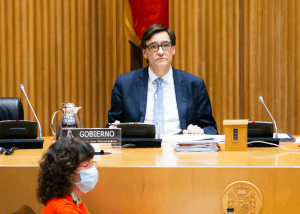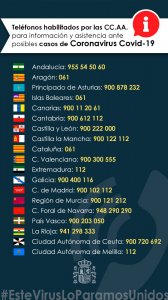Latest: Coronavirus in Spain figures (21 May)
Please support Spain in English with a donation.
Report below updated in Spain at 11.20h on Sunday 3 May.
CORONAVIRUS in SPAIN – today’s figures
The latest official figures* released by Spain’s Health Ministry in Madrid at 11.15h on Sunday 3 May confirm that 25,264 people have now died from the pandemic in Spain, up by 164 on yesterday – the lowest daily increase since 18 March.
Saturday had seen an increase of 276 Coronavirus-related deaths over Friday. Friday had been an increase of 281 over Thursday. Thursday had been 268.
The current peak of recorded deaths related to Coronavirus in a 24-hour period in Spain was on 2 April, when 950 deaths were registered.
The Health Ministry recently changed its criteria for the way the data of those infected with Coronavirus is presented. Figures released on Sunday 3 May show a total figure of those who have only tested positive through a PCR (polymerase chain reaction) test. That figure is 217,466 – an increase of 838 over yesterday.
The current peak of recorded infections for a 24-hour period in Spain was on 31 March, when 9,222 new cases were registered (including from PCR and other testing).
118,902 people have now made a full recovery, an increase of 1,654.
With regards the official figures released by the central Health Ministry for each region of Spain, there have been discrepancies in the data released independently by some of those regions, particularly for Madrid and Catalonia. Please refer to *Health Ministry data and regional discrepancies below.
Of the official figures released by the ministry today – and based only on the total 217,466 confirmed cases through PCR testing – there are now 62,205 cases in the Madrid region and where 8,332 have died (from the total 25,264 across the country). There are now 50,234 cases in Catalonia and where 5,185 have died.
There are now 12,938 known cases in the Basque Country (1,329 deaths), 12,175 in Andalusia (1,256), 16,017 in Castilla La Mancha (2,565) and 10,436 in the Valencia region (1,264).
Figures for those infected with Coronavirus in other regions are now as follows: Aragón 5,164 (761 deaths), Asturias 2,305 (280 deaths), Balearic Islands 1,908 (197), Canary Islands 2,221 (140), Cantabria 2,205 (195), Castilla y León 17,283 (1,800), Ceuta 101 (4), Extremadura 2,844 (460), Galicia 8,967 (563), Melilla 117 (2), Murcia 1,492 (134), Navarra 4,902 (462) and La Rioja 3,952 (335).
A full breakdown in Spanish of the data per region, together with age group statistics can be found by clicking here. Please also see Health Ministry data and discrepancies below.
Sign up for the FREE Weekly Newsletter from Spain in English

CORONAVIRUS in SPAIN – latest updates
Adults in Spain are enjoying their second day of being allowed to go out for walks and exercise, after restrictions were lifted for them on Saturday, following 48 days in confinement under the ‘state of alarm’ lockdown due to the Coronavirus pandemic.
On Saturday Spanish Prime Minister Pedro Sánchez also announced further measures to be introduced from Monday 4 May, as part of Phase Zero of the de-escalation of lockdown restrictions in Spain.
From Monday 4 May, it will be compulsory to wear face masks on all public transport in Spain.
Sánchez also said that next Wednesday his government will be requesting a further official extension of 15 days to the current lockdown in Spain, until 25 May. The current lockdown is in place until 9 May.
From Monday 4 May, restaurants and cafés in Spain will be allowed to open only for people to collect food, or for a takeaway delivery service.
Businesses such as bookshops, hardware shops, hairdressers and ‘workshops’ will also be able to open, but for visits by appointments only. Only one customer can be served by one employee at a time.
Preference hours at these establishments will be given to people aged over 65 in Spain. There will be restrictions on how many people can access the establishments at any one time.
Further restrictions on professional sport will also be lifted from Monday 4 May. Individual training sessions will be allowed without time limits – and players in professional leagues will be able to train individually at their clubs.
On Saturday Sánchez said that mobility across Spain would recover ‘bit by bit’, but stressed that social responsibility would be a key factor in the de-escalation of restrictions.
ALSO READ: Lifting of lockdown in Spain – full details of all phases
The Spanish prime minister also announced that his government was responding to the requests from Spain’s regional governments, and that it was allocating a special fund of €16bn for the regions.
Sánchez said he was ‘convinced’ that until a vaccine is found, Spain ‘will have new outbreaks’. He also said ‘that is why it is very important not to drop our guard’ so that any new upsurges ‘do not put stress on our national health system’.
Walks and exercise for adults
Since Saturday, restrictions in Spain have been relaxed to allow adults out to take daily walks and exercise. The full details (in Spanish) are published in Spain’s Boletín Oficial de Estado (BOE).
We have published all the key rules and guidance for walks and exercise (for both adults and children) in a separate article, together with all details of the Four Phases of the Spanish government’s plans for the lifting of lockdown measures. We will be updating the article regularly, as new measures are officially announced. It can be found here: Lifting of lockdown in Spain – full details of all phases
Sign up for the FREE Weekly Newsletter from Spain in English
Please support Spain in English
*Health Ministry data and regional discrepancies
The Spanish Health Ministry recently changed its criteria for presenting its Coronavirus (Covid-19) statistics each day, also due to some of Spain’s regions using different methods to collate their own figures.
In Catalonia, for example, the regional health department had only previously been counting figures for those who had died from Coronavirus in hospitals. This was then changed to include figures for those who had also died in nursing homes, social health centres or elderly residences, as well as at home.
Following discrepancies in the way that data has been collated, the Spanish government published an order in its Boletín Oficial del Estado (BOE) to clarify the criteria that must be used.
All regions must now report deaths and intensive care unit (ICU) admissions in the same way. A victim can only be counted in the death tally if they have tested positive for Covid-19 via a PCR (polymerase chain reaction testing) or rapid test.

The Health Ministry has also requested that each region send in the total number of infections divided into symptomatic and asymptomatic cases. In addition, they also require the number of PCR tests carried out from each region, the total number of people that have required hospital treatment, including intensive care, as well as the number of patients who have been discharged.
Salvador Illa, the Spanish Health Minister, said that, ‘Spain is following a very strict definition of cases in line with international authorities, including the World Health Organization (WHO) and the European Centre for Disease Prevention and Control (ECDC). Anyone who tests positive for Covid-19 and then dies is considered a Coronavirus fatality’.
Sign up for the FREE Weekly Newsletter from Spain in English
Please click to support Spain in English with a contribution
Below are the numbers to call for each region of Spain for information and assistance in the event of possible cases of Coronavirus – as issued by the Spanish health authorities.

Up-to-date WHO advice and facts (in English) about the Coronavirus epidemic can be found here: www.who.int/emergencies/diseases/novel-coronavirus-2019/technical-guidance.
Our previous reports on Coronavirus in Spain:
ALSO READ: Coronavirus in Spain full update (2 May)
ALSO READ: Coronavirus in Spain full update (1 May)
ALSO READ: Coronavirus in Spain full update (30 April)
ALSO READ: Coronavirus in Spain full update (29 April)
ALSO READ: Coronavirus in Spain full update (28 April)
ALSO READ: Coronavirus in Spain full update (27 April)
ALSO READ: Children enjoy first ‘hour of freedom’ in 43 days
ALSO READ: Opinion: why bullfights should stay cancelled after Covid-19
ALSO READ: Spain votes to extend lockdown to 9 May. Children to be allowed out
ALSO READ: Spanish government: children can go with adults to supermarkets, but not parks
ALSO READ: Pedro Sánchez seeks cross-party ‘Moncloa Pact’ for recovery programme
ALSO READ: Co-Vida: an inspiring community action project
ALSO READ: One day more, one day less
ALSO READ: ‘Up on the Roof’ – surviving lockdown from above
ALSO READ: Open Arms refugee NGO helping to combat Coronavirus
ALSO READ: When can La Liga restart?
ALSO READ: Lockdown in Spain set to be extended until 26 April
ALSO READ: Coronavirus in Spain: unemployment figures worst on record
ALSO READ: FC Barcelona players agree to 70% pay cut, and will ensure staff receive 100%
ALSO READ: Animal rights NGO starts petition against possible state aid for cancelled bullfights
ALSO READ: Spain publishes list of hotels that will remain open
ALSO READ: Video of boy training as goalkeeper in isolation goes viral
ALSO READ: The new restrictions at Spain’s airports, ports and land borders
ALSO READ: Madrid starts receiving patients at IFEMA exhibition centre ‘hospital’
ALSO READ: Walking a goat or a Vietnamese pig is not allowed
ALSO READ: Coronavirus in Spain – full advice for British travellers seeking to return to the UK
ALSO READ: ‘This virus we will stop together’ – video
ALSO READ: Despite lockdown, Spaniards applaud health workers from balconies every evening
Editor’s note:
At Spain in English we’re always keen to also publish positive stories and features about life in Spain – not just the current news. With all cultural and sporting events currently on hold, as well as travel and gastronomic excursions, we welcome on-going contributions from all of you who’d like to send us articles for publication. Although we are unable to currently pay for contributions, we will certainly credit you and share the articles across our social media network (if of interest) – and/or also link to your own blogs or other sites. We currently welcome upbeat, positive and fun articles – perhaps how you’re coping with the ‘lockdown’ in your own area of Spain – or how your community is responding, or recommendations of help to others. We have a dedicated ‘Opinion, Blogs & Spanish Experiences‘ section where your articles will appear. We will edit for clarity and length only – and we reserve the right to not publish. Articles should be sent via email to editorial@spainenglish.com(preferably with a photo and credit details), and should be around 500 words (800 to 1,000 max). We will try to respond to everyone, but please be patient with us. We’re a very small team but with big ambitions! Please stay safe. Thank you for reading and following us.
Sign up for the FREE Weekly Newsletter from Spain in English



2 comments
Hi, whilst all your info on the deescalation phases has been great and informative, at no stage do you seem to have published any article regarding lifting the restrictions on driving i.e. when will it be possible for more than one person from the same household be able to travel together for shopping ? Can you assist please
Hi David. If we haven’t published that information yet, then it is because it hasn’t been officially announced yet by the authorities. We believe that further details will be announced to coincide with the start of ‘Phase One’, starting from 10 May. Hope this helps for now. We have created a separate article for all updates on the lifting of restrictions – and it will be updated regularly.